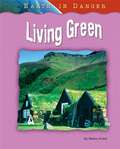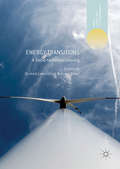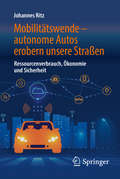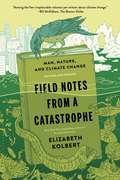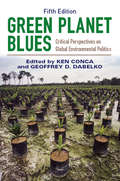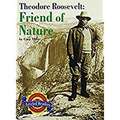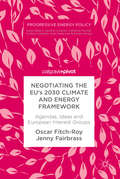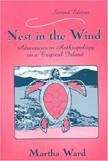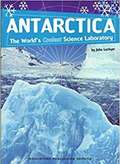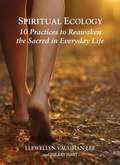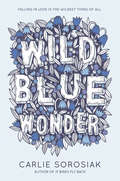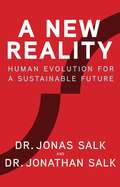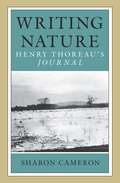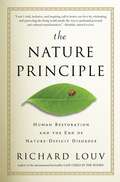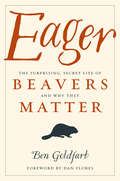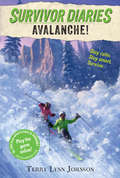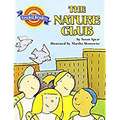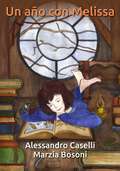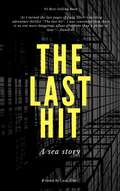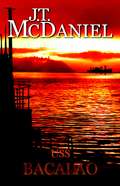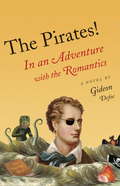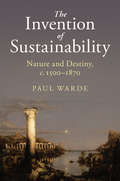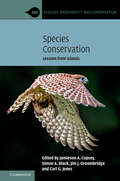- Table View
- List View
Living Green (Earth in Danger)
by Helen OrmeFrom hybrid cars to energy-efficient light bulbs, the green movement has generated interest in lifestyle changes that help preserve and protect the environment. Living Green pairs easy-to-read text with vibrant photos to engage kids as they explore ways to maintain our natural resources for future generations. A section in the back of the book will inspire young environmentalists by suggesting ways they can help protect their planet.
Energy Transitions
by Olivier Labussière Alain NadaïThis book elucidates what it means to transition to alternative sources of energy and discusses the potential for this energy transition to be a more democratic process. The book dynamically describes a recent sociotechnical study of a number of energy transitions occurring in several countries - France, Germany and Tunisia, and involving different energy technologies - including solar, on/off-shore wind, smart grids, biomass, low-energy buildings, and carbon capture and storage. Drawing on a pragmatist tradition of social inquiry, the authors examine the consequences of energy transition processes for the actors and entities that are affected by them, as well as the spaces for political participation they offer. This critical inquiry is organised according to foundational categories that have defined the energy transition - ‘renewable’ energy resources, markets, economic instruments, technological demonstration, spatiality (‘scale’) and temporality (‘horizon(s)’). Using a set of select case studies, this book systematically investigates the role these categories play in the current developments in energy transitions.
Mobilitätswende – autonome Autos erobern unsere Straßen
by Johannes RitzDieses Buch beleuchtet die unterschiedlichen Facetten einer Mobilität mit selbstfahrenden (autonomen) Fahrzeugen. Angefangen bei der Elektromobilität, werden die Parkplatzproblematik, Carsharing und Haftungsfragen unter dem Aspekt einer zunehmenden Verbreitung autonomer Fahrzeuge betrachtet. Auch ökonomische und umweltpolitische Fragen sind aufgeworfen (Ressourcenknappheit, Klimawandel, automatisierte Logistik) und versucht zu beantworten. Können Maschinen moralisch handeln, wie steht es um die Cybersicherheit und den Technikmissbrauch, sind weitere Fragen, die in diesem Buch thematisiert werden.
Field Notes from a Catastrophe: Man, Nature, and Climate Change
by Elizabeth KolbertThis description of the realities of global warming is a passionate plea for action whilst there is still time. The author approaches global warming from all angles, visiting the Artic, the North of England, Holland and Puerto Rico, interviewing researchers and environmentalists and explaining the science and the studies.
Green Planet Blues: Critical Perspectives on Global Environmental Politics (5th Edition)
by Ken Conca Geoffrey D. Dabelko<p>Revised and updated throughout, this unique anthology examines global environmental politics from a range of perspectives (contemporary and classic, activist and scholarly) and reflects voices of the powerless and powerful. Paradigms of sustainability, environmental security, and ecological justice illustrate the many ways environmental problems and their solutions are framed in contemporary international debates about climate, water, forests, toxics, energy, food, biodiversity, and other environmental challenges of the twenty-first century. Organized thematically, the selections offer a truly global scope. Seventeen new readings discuss climate justice, environmental peacebuilding, globalization, land grabs, corporate environmentalism, climate adaptation, gender, disaster risk, resilience, and the future of global environmental politics in the wake of the 'Rio+20' global summit of 2012. <p>This book stresses the underlying questions of power, interests, authority, and legitimacy that shape environmental debates, and it provides readers with a global range of perspectives on the critical challenges facing the planet and its people.</p>
Treasure in the Trees
by Christopher ChengTreasure in the Trees explores the beauty of nature and science.
Theodore Roosevelt: Friend of Nature (Leveled Readers )
by Gary MillerAll his life, Theodore Roosevelt worked to understand and to preserve nature. As you read, stop every so often to evaluate how well the author tells about Theodore Roosevelt's life.
Negotiating the EU’s 2030 Climate and Energy Framework: Agendas, Ideas And European Interest Groups (Progressive Energy Policy Ser.)
by Oscar Fitch-Roy Jenny FairbrassIn 2014, European heads of state selected new targets for the EU as part of the 2030 climate and energy framework. These targets will guide the ambition and nature of EU policy in this area until 2030 and are likely to have important implications for Europe’s transition to a low-carbon economy. This book exposes the role of civil society and business interest groups in setting the policymaking agenda and defining the range of options for the framework. Based on a unique sample of 32 in-depth interviews with Brussels policy elites, this book casts EU interest representation in a new light. In a novel application of the ‘multiple streams approach’, sequential chapters present the problems faced by policymakers, the range of policy options available to address them and the political constraints within which policy entrepreneurs attempted to attached policies to problems.
Nest in the Wind: Adventures in Anthropology on a Tropical Island (2nd Edition)
by Martha WardDuring her first visit to the beautiful island of Pohnpei in the middle of the Pacific Ocean, anthropologist Martha Ward discovered people who grew quarter-ton yams in secret and ritually shared a powerful drink called kava. She managed a medical research project, ate dog, became pregnant, and responded to spells placed on her. Thirty years later she returned to Pohnpei to learn what had happened there since her first visit. Were islanders still casual about sex? Were they still obsessed with titles and social rank? Was the island still lush and beautiful? Had the inhabitants remained healthy? This second edition of Ward's best-selling account is a rare, longitudinal study that tracks people, processes, and a place through decades of change. It is also an intimate record of doing fieldwork that immerses readers in the sights, smells, tastes, sounds, and the sensory richness of Pohnpei. Ward addresses the ageless ethnographic questions about family life, politics, religion, traditional medicine, magic, and death together with contemporary concerns about postcolonial survival, the discontinuities of culture, and adaptation to the demands of a global age. Her discoveries illuminate the evolution of a culture possibly distant from yet important to people living in other parts of the world.
Antarctica: The World's Coolest Science Laboratory
by John LockyerAntarctica: The World's Coolest Science Laboratory by John Lockyer.
Spiritual Ecology: 10 Practices to Reawaken the Sacred in Everyday Life
by Llewellyn Vaughan-Lee Hilary Hart<i>Spiritual Ecology: 10 Practices to Reawaken the Sacred in Everyday Life</i> offers inspiring and practical guidance for reconnecting to the sacred in every day life and transforming our relationship with the Earth. Describing the power of simple, daily practices such as Walking, Gardening, Cooking with Love, and Prayer, this small book supports profound changes in how we think about and respond to the ecological crisis of our times.
Wild Blue Wonder
by Carlie SorosiakLast June, the summer camp Quinn’s family owns in Winship, Maine, was still a magical place. A place where wild blueberries grew no matter the season, a legendary sea monster lurked in the waters, and Quinn fell in love with her best friend, Dylan. Then the accident happened. Now it’s winter, the magic has drained from Quinn’s life, and she knows it’s her fault. But the new boy in town, Alexander, doesn’t see her as the monster she believes herself to be. As Quinn lets herself open up again, she begins to understand the truth about love, loss, and monsters—real and imagined. This wondrous novel about love, loss, and moving on is perfect for fans of Morgan Matson and Jenny Han.
A New Reality: Human Evolution for a Sustainable Future
by Jonas Salk Jonathan Salk David Dewane Elizabeth H BlackburnA New Reality: Human Evolution for a Sustainable Future provides a startling, fresh new message of understanding, perspective and hope for today’s tense, rapid-fire, kaleidoscopically changing world. A New Reality: Human Evolution for a Sustainable Future provides a startling, fresh new message of understanding, perspective and hope for today’s tense, rapid-fire, kaleidoscopically changing world. Drawn from the writings of visionary scientist Jonas Salk, who developed the polio vaccine, extended and developed by his son Jonathan, the message of the book explodes from the past and sheds light on tensions that besiege us and the currents of discord that are raging as these words are written. More importantly, it indicates a way forward out of our current situation. Written by a world-famous doctor and folk hero, based on population data, rich in visual imagery, elegantly designed, and clearly written, A New Reality is unique in the marketplace. Readable in one or two sittings, it is accessible to the general reader while at the same time being of essential value to policy makers and academics. Its brevity and simplicity of design belie the importance and sophistication of its message. “We are at a point in the course of human social evolution when the demands of survival converge with the higher ideals of humankind and the well-being and flourishing of human society. It is up to us to see that we navigate this transition, adapting to and emerging in a new reality.” —A New Reality Our country is divided and polarized. Terrorism is a major threat throughout much of the world. Mass migrations are causing national and international tension. Population growth continues to increase, especially in the developing regions of the world. Controversy rages as to the use of fossil fuels versus the development of alternative forms of energy. Disagreement continues about climate change. Opposing currents of opinion collide as to how much we should help other areas in the world and how much to help ourselves. Basic values are in conflict. More than 40 years ago, Jonas Salk understood that we are at a unique moment in the history of the human species. After centuries of increase, population growth has begun to slow and is trending toward equilibrium. This change is accompanied by an equally significant change in human values—a shift from those based on unlimited availability of resources, unremitting growth, excess, independence, competition and short-term thinking to those based on limits, equilibrium, balance, interdependence, cooperation and long-term thinking. This momentous transition is the source of far-reaching tension and conflict. The way through this difficult era is to understand its basis and to focus on new values that will be of the greatest benefit to humankind. There is an urgency, however, and failure to adapt will result in disaster both for humanity and for the planet as a whole. A New Reality delivers a message of both caution and hope. Readers across the social and political spectrum will find it a reasoned and balanced counterpoint to current social and political trends. Its elegant design and long-range perspective will appeal to general readers, policy makers, millennials, baby boomers, teachers, and students, filling a need in the marketplace for a work of positivity and wisdom in otherwise bleak times.
Writing Nature: Henry Thoreau's Journal
by Sharon CameronAt his death, Henry Thoreau left the majority of his writing unpublished. The bulk of this material is a journal that he kept for twenty-four years. Sharon Cameron's major claim is that this private work (the Journal) was Thoreau's primary work, taking precedence over the books that he published in his lifetime. Her controversial thesis views Thoreau's Journal as a composition that confounds the distinction between public and private--the basis on which our conventional treatment of discourse depends.
The Nature Principle: Human Restoration and the End of Nature-Deficit Disorder
by Richard LouvIn this book the author argues that a strong connection to nature is essential for human health. Supported by research, anecdotal evidence, and personal stories, the author shows how tapping into the restorative powers of the natural world can boost mental acuity and creativity; promote health and wellness; build smarter and more sustainable businesses, communities, and economies; and ultimately strengthen human bonds. He outlines seven precepts he calls the "Nature Principle", which include balancing technology excess with time in nature; a mind/body/nature connection, which he calls "vitamin N," that enhances physical and mental health; expanding our sense of community to include all living things; and purposefully developing a spiritual, psychological, physical attachment to a region and its natural history.
Eager: The Surprising, Secret Life of Beavers and Why They Matter
by Ben GoldfarbIn Eager, environmental journalist Ben Goldfarb reveals that our modern idea of what a healthy landscape looks like and how it functions is wrong, distorted by the fur trade that once trapped out millions of beavers from North America’s lakes and rivers. The consequences of losing beavers were profound: streams eroded, wetlands dried up, and species from salmon to swans lost vital habitat. Today, a growing coalition of “Beaver Believers”—including scientists, ranchers, and passionate citizens—recognizes that ecosystems with beavers are far healthier, for humans and non-humans alike, than those without them. From the Nevada deserts to the Scottish highlands, Believers are now hard at work restoring these industrious rodents to their former haunts. Eager is a powerful story about one of the world’s most influential species, how North America was colonized, how our landscapes have changed over the centuries, and how beavers can help us fight drought, flooding, wildfire, extinction, and the ravages of climate change. Ultimately, it’s about how we can learn to coexist, harmoniously and even beneficially, with our fellow travelers on this planet.
These Rocks Count!
by Alison Formento Sarah SnowMr. Tate's class is about to learn that there's more to rocks than being dirty lumps on the ground. On this field trip they're visiting the rocky ridge mountains to learn about rocks. At first the children think rocks will be boring, but they soon learn that rocks are all around us in ways we might not expect--such as glass and toothpaste! This is a fixed-format ebook, which preserves the design and layout of the original print book.
Avalanche! (Survivor Diaries)
by Terry Lynn Johnson Jani OrbanA high-stakes adventure series perfect for fans of the I Survived series and Hatchet. Twelve-year-old twins Ashley and Ryan are skiing with their parents in Wyoming's Grand Teton Mountains where there is a ground-shaking rumble. Unstable snow rushes downhill and buries them in icy white. It will take all of their knowledge and grit to survive. With seventeen years of hands-on experience and training in remote areas, survival expert Terry Lynn Johnson (Ice Dogs; Sled Dog School) creates on-the-edge-of-your-seat storytelling featuring the real skills that kids need to survive a disaster. This page-turner with illustrations includes survival tips from the National Avalanche Center and U.S. Forest Service. You could have a better chance of surviving a real-life avalanche after reading this book! Stay calm. Stay smart. Survive.
The Nature Club: Leveled Readers
by Susan SpearHow can you have a nature club in the city? As you read the story, stop from time to time and summarize what has happened so far.
Un Año Con Melissa
by Marcela Gutiérrez Bravo Alessandro Caselli Marzia BosoniRespeto por el ambiente, por los animales y por nosotros mismos, eso es de lo que tratan los diálogos entre Melissa, una niña de seis años con muchos deseos de comprender el mundo, y el Señor Gato, un sagaz gato vagabundo. Seis historias para contar un año de vida de la niña y para compartir un poco de la sabiduría que el gato ha reunido por las calles del mundo. Entre una historia y la otra, el gato se dirige a los padres y a los adultos en general para pedirles también a ellos el detenerse un momento y reflexionar sobre temas importantes de ecología, dolor y amistad. Un libro para niños, pero también un libro para grandes que saben todavía encontrar tiempo para hablar con los pequeños. Y con los gatos.
The Last Hit
by Luca Tlleri Giulio Pio DimaA group of pirates, a crew impossible of our days and our seas, take part on an operation in the mid of Mediterranean. A mysterious character seemed calculated all good while police, coasters guards and anti-drugs departments are ready to stop these criminals trafics active since much time. The story, covered by a sad humor, is heavy and with deads. Anyway the real trophy is unknown yet.
USS Bacalao
by J. T. McDaniel Franco G. RovedoJ.T. McDaniel assume o comando com a mão firme de um mestre em sua arte, criando uma representação precisa e fascinante da vida diária a bordo de um submarino de ataque na década de 1940. Do estaleiro do construtor em Connecticut, aos combates velozes no teatro do Pacífico, ao coração trovejante de profundidades explosivas, cada detalhe soa com autenticidade. McDaniel escreve com a precisão técnica de Tom Clancy, o ritmo de Michael DiMercurio e a compreensão humana de Edward L. Beach. Um leitor simplesmente não pode querer mais. O USS Bacalao é a história de um submarino da frota americana da classe Gato desde o pátio da Electric Boat Company na cidade de Groton de pré-guerra, em Connecticut, passando pelos primeiros treinamentos, presenciando o ataque japonês a Pearl Harbor, e atingindo o coração do Império Japonês. De Pearl Harbor a Fremantle, o pequeno barco e sua corajosa tripulação atacam um inimigo determinado e enfrentam a sua própria burocracia para levar a guerra ao inimigo. E, apesar de tudo, Lawrence Miller está lá, subindo lentamente a partir do quarto na lista de oficiais do barco, partindo para uma excursão no comando de um antigo submarino no Alasca e finalmente retornando a Bacalao como seu último oficial comandante. Uma aventura emocionante e verdadeira que encanta aqueles que admiram o mar e seus personagens.
The Pirates!: In an Adventure with the Romantics
by Gideon DefoeIn Gideon Defoe's fifth Pirates! adventure, the dashing Pirate Captain and his intrepid crew encounter perhaps the most swashbuckling poets in history: Lord Byron, Percy Bysshe Shelley, and Shelley's fiancée, Mary Godwin. While visiting the shores of Lake Geneva to restore their spirits and their finances, the Pirate Captain and his crew encounter some surprising fellow adventurers, literary giants of their age: the swaggering Lord Byron, the oddly shifty Percy Shelley, and his smart, quite attractive fiancée, Mary. Together the poets and pirates embark upon a journey that leads from the curiously adventureless Switzerland into the darkest bowels of Oxford, and finally to the forbidding heart of eastern Europe. Amidst haunted castles and early feminism, the Pirate Captain will confront some important questions, namely: What is the secret behind his mysterious belly tattoo? Is "Zombuloid, the corpse-beast" a better name for a monster than "Gorgo: Half-man, half-seaweed?" And, most importantly, what happens when a pirate finally falls in love?
The Invention of Sustainability: Nature and Destiny, c.1500–1870
by Paul WardeThe issue of sustainability, and the idea that economic growth and development might destroy its own foundations, is one of the defining political problems of our era. This ground breaking study traces the emergence of this idea, and demonstrates how sustainability was closely linked to hopes for growth, and the destiny of expanding European states, from the sixteenth century. Weaving together aspirations for power, for economic development and agricultural improvement, and ideas about forestry, climate, the sciences of the soil and of life itself, this book sets out how new knowledge and metrics led people to imagine both new horizons for progress, but also the possibility of collapse. In the nineteenth century, anxieties about sustainability, often driven by science, proliferated in debates about contemporary and historical empires and the American frontier. The fear of progress undoing itself confronted society with finding ways to live with and manage nature.
Species Conservation: Lessons from Islands (Ecology, Biodiversity and Conservation)
by Jamieson A. Copsey Simon A. Black Jim J. Groombridge Carl G. JonesThis book brings together leading conservation practitioners to reflect on their response to the current global biodiversity crisis, through the lens of island species recovery and management. Initial chapters cover the biological understanding of small population biology and the growing threat of invasive species, while subsequent chapters discuss the management of these threats and the complexity of leading projects within a dynamic and still relatively unknown system. Multiple case studies from islands worldwide illustrate key points, allowing readers to draw on the first-hand practical experience of experienced professionals. This resource will be invaluable to both current and future conservation professionals, helping them to go beyond disciplinary 'comfort zones' and develop, manage and lead projects over extensive timeframes in a way that brings others with them on the journey.
